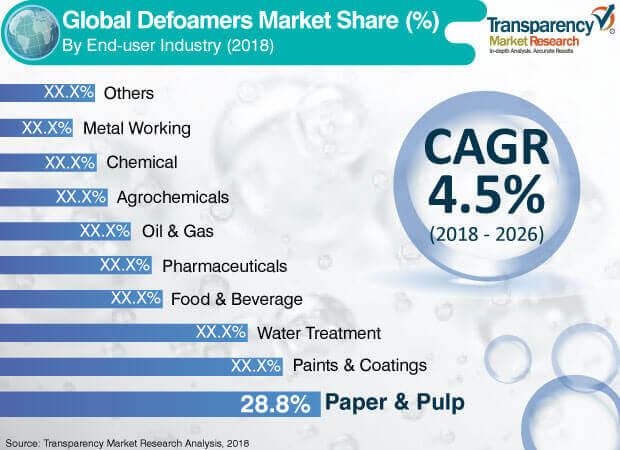Defoamers: Essential Tools for Enhancing Efficiency in Cleaning Products
Defoamers: Essential Tools for Enhancing Efficiency in Cleaning Products
Blog Article
Discover the Leading Benefits of Making Use Of Defoamers in Industrial Processes
The usage of defoamers in industrial processes provides an array of engaging benefits that can enhance operational performance and item quality. By efficiently managing foam manufacturing, these representatives not only optimize material flow however additionally add to substantial cost reductions and improved sustainability. The ramifications of embracing defoamers might be extra extensive than originally perceived.
Enhanced Process Effectiveness
Enhancing industrial processes commonly entails resolving foaming issues, which can hinder operational efficiency. Foam formation can interfere with the proper functioning of equipment, reduce the effective usage of resources, and complicate the surveillance of critical parameters. By implementing defoamers, sectors can effectively minimize these issues, leading to structured procedures and boosted performance.
Defoamers job by destabilizing the foam framework, enabling quick collapse and substantial decrease in foam quantity. This action not only enhances the circulation of materials via tools, such as reactors, mixers, and pipelines, however likewise minimizes disturbances brought on by foam overflow. Devices downtime is reduced, permitting for a much more continuous and reliable production procedure.
Furthermore, the usage of defoamers can cause decreased power consumption. With much less foam to manage, compressors and pumps can operate much more effectively, resulting in reduced operational prices and an overall improvement in process throughput. Eventually, the strategic use defoamers not just addresses prompt foaming obstacles but likewise adds to a much more reliable industrial environment, fostering a competitive benefit in a demanding market.
Improved Product High Quality
The assimilation of defoamers in industrial procedures plays an important duty in enhancing product high quality. By properly controlling foam development, defoamers add to the uniformity and uniformity of final products. Too much foam can lead to aeration, which negatively affects the appearance and security of formulations, particularly in markets such as food and drinks, drugs, and coatings.

Furthermore, defoamers help with far better blending and dispersion of active ingredients, causing homogeneity in formulas. This is important in applications where specific component ratios are critical for efficiency and security. Additionally, the removal of foam can minimize the risk of contamination throughout production, more protecting item stability.
Ultimately, by enhancing product top quality, defoamers not only boost consumer satisfaction but likewise reinforce brand reputation. Their function in keeping premium criteria underscores their relevance in modern industrial procedures.
Cost Reduction Advantages
Implementing defoamers in industrial procedures can lead to considerable expense decrease benefits. By efficiently regulating foam development, defoamers reduce product loss throughout production, thereby enhancing product use. This decrease in waste translates directly into lower raw product prices, enhancing overall functional effectiveness.
Additionally, the usage of defoamers can decrease energy consumption. Extreme foam Continue can impede devices efficiency, bring about raised power needs to maintain production levels. By reducing foam, defoamers help with smoother operations, enabling machinery to site here run a lot more effectively and lowering power expenses.

Additionally, defoamers can shorten processing times. Foam can develop added obstacles that lengthen manufacturing cycles. By making use of defoamers, markets can enhance their processes, resulting in faster turnaround times and improved throughput. This efficiency not just increases manufacturing however likewise enables companies to fulfill market needs a lot more quickly.

Environmental Impact Mitigation
In commercial processes, the use of defoamers plays a critical function in mitigating ecological influences connected with foam generation. Foam can bring about substantial operational inadequacies, resulting in raised emissions and waste generation. By efficiently managing foam, defoamers aid maintain process effectiveness, therefore reducing the general view website ecological footprint of operations.
Furthermore, extreme foam can overflow control systems, bring about spills that may contaminate soil and water resources. Defoamers help lessen this threat by making certain that foaming does not exceed prescribed limitations, advertising conformity with ecological guidelines. This aggressive strategy not just safeguards ecological communities yet additionally boosts the sustainability of commercial methods.
Furthermore, the use of defoamers can lower energy consumption in various procedures. defoamers. Reducing foam development lessens the requirement for extra energy-intensive steps, such as increased agitation or pumping, which might or else be required to manage foam. Consequently, the fostering of defoamers lines up with broader sustainability goals by advertising energy efficiency while decreasing the carbon impact of industrial tasks.
Inevitably, integrating defoamers into commercial operations is a critical procedure that supports ecological stewardship and accountable source administration.
Adaptability Across Industries
Across different sectors, defoamers demonstrate amazing adaptability, adjusting to the particular requirements of varied applications. In the food and drink market, for example, defoamers are vital to preserving item quality by protecting against foam formation throughout processing, which can influence texture and taste. Similarly, in the pharmaceutical market, defoamers make certain the stability of solutions, enhancing product efficiency and consistency.
In the chemical manufacturing realm, defoamers promote smoother operations by reducing foam in response vessels, hence improving yield and minimizing downtime. The paper and pulp sector relies on defoamers to improve the performance of pulp handling and paper production, guaranteeing optimum item integrity. Additionally, in wastewater treatment facilities, defoamers play an essential duty in controlling foam during aeration processes, causing better treatment results.
The convenience of defoamers includes the oil and gas industry, where they assist in handling foam in boring liquids and manufacturing procedures. By customizing formulas to satisfy details sector needs, defoamers work as indispensable tools that enhance operational efficiency, product top quality, and total procedure performance throughout a plethora of sectors. Their adaptability emphasizes their worth in modern-day commercial applications.
Final Thought
To conclude, the use of defoamers in commercial processes presents countless benefits, including enhanced performance, enhanced product quality, substantial expense reductions, and favorable ecological impacts. Their capacity to properly manage foam formation contributes to functional continuity and source optimization. The versatility of defoamers throughout diverse sectors highlights their crucial duty in promoting lasting practices and earnings. The integration of defoamers stands for a strategic strategy to dealing with obstacles connected with foam administration in various producing atmospheres.
Ultimately, the tactical usage of defoamers not just addresses prompt frothing challenges however likewise adds to an extra reliable commercial ecosystem, fostering a competitive advantage in a demanding market.
In industrial processes, the use of defoamers plays a critical role in mitigating environmental impacts associated with foam generation. By effectively controlling foam, defoamers assist preserve procedure efficiency, thus lowering the overall ecological impact of procedures.
In addition, in wastewater therapy centers, defoamers play an essential role in managing foam during oygenation processes, leading to better therapy end results.

Report this page